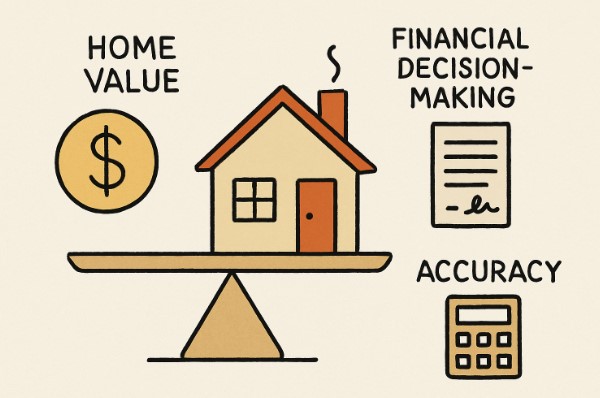Understanding Home Valuation
Determining the actual value of your home is both a science and an art. Home valuation is the study and analysis of what a property is worth right now, considering elements like location, size, updates, age, and how much comparable homes nearby have recently sold for. Accurately valuing homes is a cornerstone for smart decisions in real estate transactions—for buyers, sellers, and investors alike.
Without a reliable and precise valuation, it becomes easy to misstep when setting a price, making offers, or negotiating effectively. Homeowners in Knoxville seeking expertise in valuation often turn to local professionals, such as Knoxville, TN, real estate agent Bessie Whiteside, who understands both trends and underlying property fundamentals. Her neighborhood knowledge helps you confidently establish your home’s correct market position. Accurate home valuations are essential to avoid stalled sales, financial loss, and insurance issues. They provide clarity during annual reviews or life transitions such as selling, refinancing, or relocating by setting realistic timelines and financial expectations. Understanding various valuation methods, their pros and cons, and combining modern tools with local market expertise helps ensure informed decisions and minimizes common pitfalls.
Methods of Home Valuation
- Automated Valuation Models (AVMs): These digital tools use algorithms and property data to estimate your home’s value instantly. AVMs examine public records, recent sales, and neighborhood data. While convenient, they may lack nuance, especially in unique or rapidly changing markets.
- Comparative Market Analysis (CMA): Typically provided by real estate agents, a CMA examines sales of similar homes in your neighborhood. This approach allows for a deeper understanding of hyper-local market trends, remodeling impacts, and subtle property features that influence value.
- Professional Appraisals: Licensed appraisers give the most robust evaluation, combining professional judgment with data-driven analysis. Their reports often weigh heavily for lenders, insurers, and during legal proceedings.
Benefits of Accurate Home Valuation
Precision in valuation isn’t just about numbers—it’s about empowerment. Setting the correct price from the outset positions your home to attract genuine buyers, preventing wasted market time. Overpricing can drive buyers away, while underpricing can mean leaving money on the table. Establishing a credible foundation makes negotiations smoother because you’re well prepared to justify your pricing with data-backed reasoning.
- Setting the Right Price: Achieving balance to maximize your proceeds and appeal to qualified buyers.
- Attracting Serious Buyers: Listings priced accurately stand out as strong opportunities, often leading to faster, more competitive offers.
- Effective Negotiations: An informed seller is a powerful negotiator—knowing your property’s real worth helps you avoid underselling or overpricing mistakes.
Impact on Insurance Coverage
Your home’s replacement value forms the basis of your homeowners’ insurance coverage. If your valuation is too low, you risk being underinsured when disaster hits, potentially facing major financial setbacks. Consistently updating your property’s value ensures your policy keeps pace with improvements or rising replacement costs. For more details on how home valuation impacts your coverage, visit the concise guide by Forbes Advisor. Regularly reviewing your policy helps prevent coverage gaps, and consulting with your insurance agent ensures your coverage stays accurate and up to date.
Influence on Property Taxes
Property taxes are tied to government-assigned assessed values, which should reflect fair market value. Over-assessments common in hot markets can lead to overpaying, while under-assessments might cause municipal revenue imbalance and audit risks. Homeowners should review their annual assessments closely—appealing values that seem inaccurate can yield substantial savings.
Role in Refinancing and Equity Loans
Lenders base major financial decisions, such as refinancing approval and home equity loan eligibility, on your property’s value. Overstated appraisals can derail loan applications, while undervalued homes may result in higher interest rates or reduced borrowing power. Ensuring your home’s actual value is reflected in paperwork leads to better loan options and more predictable terms from banks or credit unions.
Technological Advances in Valuation
Artificial intelligence, big data, and machine learning are transforming how homes are valued. Tools can now analyze thousands of sales, trends, and economic drivers in seconds. However, these resources should be viewed as supplemental—nothing can replace an expert eye familiar with neighborhood dynamics and unique property quirks. Using online valuations as a starting point, but verifying with a reputable appraiser or local real estate adviser, is the best strategy for most homeowners.
Conclusion
Accurate home valuations are fundamental for navigating the complex world of homeownership. From listing a property and managing insurance to refinancing and paying taxes, a reliable measure of your property’s worth influences countless financial and lifestyle decisions. By leveraging the advantages of both professional expertise and the latest technology, you ensure that you’re equipped to make smart, confident choices with your greatest asset.

